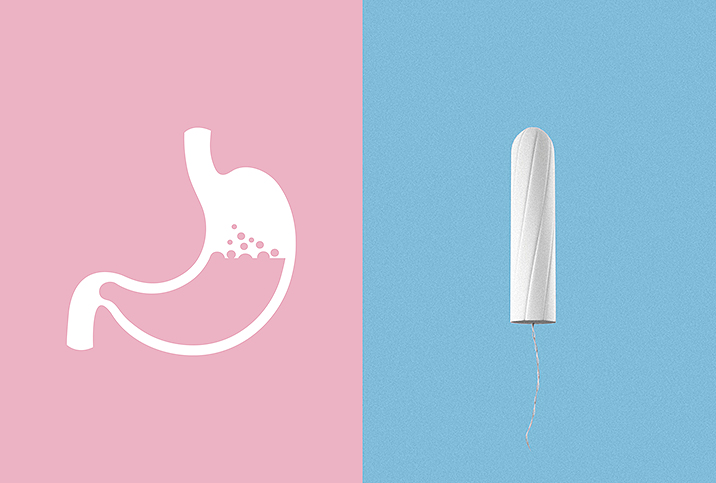How Might Menopause Affect My IBS Symptoms?

During the menopausal transition, your body will go through a variety of changes as it adjusts to new hormone levels. You may already know the common symptoms of menopause, such as hot flashes, vaginal dryness, mood changes, changes in sex drive and brain fog.
However, the lesser-known gastrointestinal menopausal symptoms can affect your quality of life in significant ways.
What is irritable bowel syndrome?
Irritable bowel syndrome (IBS) is a common, chronic disorder of the gastrointestinal (GI) tract: the stomach and small and large intestines. It is more often diagnosed in women than men.
The symptoms of IBS can include:
- Cramping
- Abdominal pain
- Bloating
- Gas
- Diarrhea
- Constipation
To learn more about how menopause affects IBS and other gastrointestinal issues, we spoke with Margaret Heitkemper, R.N., Ph.D., and Kendra Kamp, R.N., Ph.D., professors in the school of nursing at the University of Washington in Seattle who have researched this topic.
"IBS is a disorder of gut-brain interaction that is most likely to be diagnosed in childhood or early adult years [20s to 30s]," Heitkemper and Kamp explained. According to research, "the mean age of women with IBS is in their 40s."
Women in perimenopause and postmenopause often report gastrointestinal symptoms, including bloating, gas, constipation and diarrhea. Women with IBS may wonder if their digestive tract issues will improve or worsen as their menstrual cycle undergoes changes.
How is menopause connected to IBS?
Menopause does not cause IBS, but women with and without IBS may experience gastrointestinal issues during the menopausal transition due to fluctuating hormones.
"[The] increase in GI symptoms around the time of menses and early menopause occurs at times of declining or low ovarian hormones, suggesting that estrogen and progesterone withdrawal may contribute either directly or indirectly," Heitkemper suggested in a 2009 review.
However, more recent research on how menopause impacts IBS symptoms has found mixed results.
"In an early study we did, we found that symptoms (abdominal pain) increase around the perimenopause and then tended to decrease for women in their mid-50s, 60s and 70s. A more recent study published by [Adrienne] Lehnart at UCLA found that the severity of symptoms increased in a group of women with IBS after the age of 46, as compared to women less than 46," Heitkemper and Kamp explained.
"IBS is a condition that waxes and wanes," they continued. "During the postmenopause, the incidence of IBS tends to decrease in women. With age, there is increased concern that symptoms such as abdominal pain, acute onset of diarrhea and constipation may be related to structural changes—and thus, may necessitate more thorough evaluation and should not be assumed to be IBS."
It's difficult to know what causes these age-related differences because menopause onset and symptoms vary so much from person to person. Additionally, estrogen levels vary significantly during the menopausal transition.
While estrogen levels are generally declining during this time, they do so erratically, which also affects the symptoms you experience, according to the North American Menopause Society (NAMS).
"We need longitudinal studies with a diverse cohort of women with standardized menopause staging and biomarkers of reproductive hormones, stress markers, lifestyle factors and DGBI [disorders of gut-brain interaction] symptoms are collected," Heitkemper and Kamp said.
How do sex hormones affect GI symptoms?
Sex hormones play an important role in the gastrointestinal system, so fluctuations in these hormones can relieve and exacerbate GI symptoms. But how?
"Both estrogen and progesterone affect the muscle contraction of the GI tract," Heitkemper and Kamp said. "In addition, estrogen has a number of important effects relevant to gut health. We are just beginning to understand the association of estrogen to the gut microbiome."
Most adults maintain a fairly constant and diverse microbiome. However, as we age, the gut flora becomes less diverse, which can lead to problems. Further disruption of the microbiome can be caused by medications (antibiotics), infections and disease, they added. Ongoing research seeks to examine the clinical relevance of age-related changes in microbiome/metabolome to health.
What’s the relationship between menopause, osteoporosis and IBS?
Another important factor to keep in mind as women age is the relationship between menopause, osteoporosis and IBS.
Women are more at risk of osteoporosis than men, in part because of the role estrogen plays in keeping bones strong. As estrogen declines in the body during the menopausal transition, women become more at risk of developing osteoporosis, or bone loss.
As bone density drops, bones can fracture more easily. And it’s believed that women lose 10 percent of their bone mass within the first five years following menopause.
Menopause is not the only risk factor for osteoporosis. IBS is, too. In a 2012 article published in the medical journal Osteoporosis International, researchers suggested that people diagnosed with IBS were at an increased risk of developing osteoporosis.
This means it's doubly important for women in postmenopause who have IBS to be screened for osteoporosis and bone health decline.
How can you treat GI issues during menopause?
For people suffering from gastrointestinal issues during menopause, it's important to incorporate the self-management of symptoms into their routine.
"IBS can be a lifelong condition, and strategies such as cognitively restructuring your thinking about the symptoms, reducing stress, relaxation training and diet adjustments can help," Heitkemper and Kamp explained. "Many women with IBS report that both stress and their diet, along with poor sleep, contribute to the severity of their symptoms."
To help improve your gastrointestinal issues, do the following:
- Practice sleep hygiene.
- Identify and eliminate trigger foods.
- Be mindful of not just what you eat but when and how you eat. Eating in irregular places and at irregular times, such as in your car, can aggravate symptoms.
- Increase your dietary fiber intake.
When should you seek help for menopausal IBS symptoms?
If you have been suffering from gastrointestinal symptoms that are affecting your quality of life—abdominal pain, cramping, bloating, diarrhea, constipation—schedule an appointment with your doctor. You may be suffering from IBS.
However, if your symptoms are new or worse than usual, it may be a different condition causing your discomfort, Heitkemper and Kamp warned.
"All women should be evaluated for any 'red flag symptoms,'" the UW professors advised in their 2021 article published in the medical journal Women's Midlife Health.
Red flag symptoms include:
- Unintentional or unexplained weight loss
- Rectal bleeding
- Family history of bowel cancer or ovarian cancer
- Iron deficiency or anemia
- Unexplained bowel habits for more than six weeks in people older than 50
- Elevated inflammatory markers
Such symptoms are indicative of a structural issue, such as colorectal cancer or endometriosis, rather than IBS. This is why it's so important to see a healthcare provider who can perform a comprehensive assessment.
The bottom line
Menopause is different for every woman. For some women, menopause can cause an uptick in gastrointestinal issues. Contact your doctor if the end of your monthly cycle increases your IBS symptoms.


















